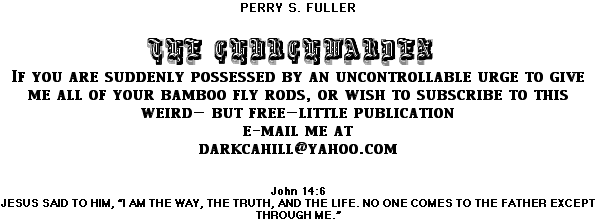
"Jesus in a Box"

"Jesus in a Box"
Grace, mercy and peace to you from God the Father and our Lord and Savior, Christ Jesus, the Crucified and Risen One, Amen.
One of my seminary professors is the kind of guy you can never quite figure out. He was always projecting an image so you couldn't get a radar fix on him. He would be railing about some provincial non-Lutheran practice followed a seminarian's grandparents (didn't matter that the seminarian's grandparents were all dead and were never Lutherans). And then he would advise us about what he considered to be something that had real merit: wine in a box. That's right, cheap, off the shelf domestic wine in a plastic lined cardboard boxes. You might agree with me that "wine" and "box" are concepts that should not occur in the same sentence. Now here's one thing that comes in a box that I really miss. First, you have to remember I am from Hawaii, a state stuck almost 3,000 miles from the nearest land mass. That isolation causes us to have some, well, unique ideas. One is the box lunch. Oh, I know you think you have box lunches here, but unless you've been to Kalihi, a colorful neighborhood in Honolulu, you haven't really seen box lunch. Kalihi is the only place in the universe where Masu's Massive Box Lunch is available. So what's so special about Masu's, you ask. Well, here is a typical Masu's box lunch, and I am not joking or exaggerating: baked baby lobster tail, crab stuffed with shrimp, charcoal broiled sirloin steak in teriyaki sauce, fried chicken, shrimp tempura, shoyu hot dogs, baked Spam, and Tahitian coconut cake. That's right, over three pounds of food stuffed in box for lunch, and that also includes two scoops of rice and macaroni salad, all for $7.85.
You probably find my beloved Masu's box lunch to be excessive, medically unsafe or just plain uncouth, especially the part about the Spam--it's a Hawaii thing. You might be right about that. But what about the idea of Jesus in a box? From the very beginning, people have been trying to put Jesus in a box.
Recall from last week in the Gospel text for Easter Sunday St. Mary Magdalene wept because the body of Jesus was missing from the tomb. The resurrected Lord called her name and she grabbed and embraced Him. That was the wrong thing for her to do as we know from Christ commanding her not to cling to Him. Mary's desired to keep Christ here on earth, to be Israel's king. She had placed Jesus into a box, a box built with her desires for an earthly king herself and for her country.
In today's Gospel St. Thomas put Jesus into a different box, one labeled "dead and gone." When the other apostles said they had seen Christ Jesus and that He was alive, Thomas said, "unless I see in his hands the mark of the nails, and place my finger into the mark of the nails, and place my hand into his side, I will never believe." Notice what Thomas said? Not that he could not believe but that unless his demand for evidence was satisfied he was determined to not believe. No one knows why St. Thomas got wound up so tightly, but we know he had a proverbial burr under his saddle. He was not with the other apostles on Easter evening. Thomas did not merely doubt that Christ was resurrected from the dead. His sin was unbelief. He absolutely refused to believe the unanimous testimony of his ten fellow apostles. He also refused to believe Christ who said at least on two occasions that He would not only die, but be raised from the dead.
Unbelief is, always has been and always will be unreasonable. St. Thomas was determined to set himself against the unanimous testimony of people he had known and trusted for years and against the word of Messiah. The pride, haughtiness and arrogance of unbelief is that it demands proof to be subject to its own demands. It pretends to obey reason and genuine intelligence alone, but it does nothing of the kind. It is the manifestation of an unreasoning and unreasonable will, a secret, stubborn determination, unacknowledged by the unbeliever himself, to intentionally not believe. Thomas placed Jesus in the box of unbelief.
Let's not be too quick to judge St. Thomas. We, too, are guilty of stuffing Jesus into a box. A man is caught in adultery, defends himself by saying he doesn't love his wife anymore and refuses to repent. When the pastor places him under a ban, he leaves and goes to the liberal church down the street in a huff, claiming the pastor violated his right to receive communion and that the pastor was imposing upon the church his own personal morals. Into what box has this adulterer placed Jesus? One marked "this product contains no holiness or judgment." Lutherans do not only stuff Christ into a box when confronted with their moral sins. Take the case of a retired Lutheran school principal I know who went in the opposite direction. In a Bible study class he ran he insisted that gambling was a sin, the same as murder, adultery and theft. When the pastor corrected him, saying that gambling can be a sin if habitual and excessive but is not per se a sin, the retired principal told the pastor he was as much a minister as the pastor and it didn't matter what the Confessions said or Lutheran pastors have taught for the past five hundred years because they are mere men, and that he a synodically trained teacher, knew better than they. The box into which this retired principal locked the Lord had a foundation made of pride and walls made of self-righteousness taken from the Pharisees.
We put Jesus in a box so that God will be more manageable, so that we can fool ourselves into thinking we are without sin and have no need to repent or work on cleansing our lives that are filled with the filth of self-love and pride. The Rev. Dr. Laurence White, a confessional Missouri Synod pastor from Texas, wrote an article about the state of our synod. He said: We have become a church where much of what passes for Bible study is little more than the shared experiences of self-obsessed consumers who want the chance to talk about "what God is doing in their lives." What they really mean is what they are allowing God to do in their lives, on their terms. Real Bible study, that is, wrestling with the words and grammar of the Biblical text is too much work for us-both pastors and laymen. It's boring, and besides it might require me to change who I am and how I live.
What Pastor White said is the cure for this obsession we have for cramming Jesus into a box is nothing new to you. It is going back to the Bible and finding out what God really says instead of what we want Him to say. This is nothing more than Luther's third cardinal principal, Sola Scriptura, only by Scripture. The Great Reformer, Martin Luther, had a solution for this bad habit of putting Christ in a box. He often said, "let God be God." Human beings cannot apprehend God by means of philosophy, ethics or church by-laws; they must let God be God and see Him only where He has chosen to make Himself known. In the Smalcald Articles, Luther stressed that God reveals His wisdom and His will for us through the foolishness of Holy Scripture and the sacraments. In establishing the Church, the resurrected Christ made these available to you through the preaching of Holy Scripture that you are in the process of receiving at this very moment. If you let God be God, if you let Jesus out of the box, then let His power come to you through your suffering by denying yourself, taking up your cross daily and following Him as He bids you do in the 9th chapter of St. Luke's Gospel. When you let God be God He will reveal to you the secret of a meaningful life through Christ's death on the cross for the forgiveness of your sins.
Letting Jesus out of the box, letting Him be God means letting Him be Lord and Sovereign of your life. This means obeying Him regardless of the consequences. Yes, your ego will be bruised and your self-esteem trampled upon. If Dr. White's statistics are correct, it is a path only half of Missouri Synod's pastors, and one in six lay people, are willing to take. But choosing that difficult path pleases Christ your Savior, and it is the sure and certain path to eternal life. Let us therefore join St. Peter in his confession, "Lord, to whom shall we go? You have the words of eternal life."
And now, may the peace of God that passes all understanding guard your hearts and minds through Christ Jesus, our Lord. Amen.
©copyright 2007, Reverend Wesley Kan



©copyright 2007, Perry S. Fuller